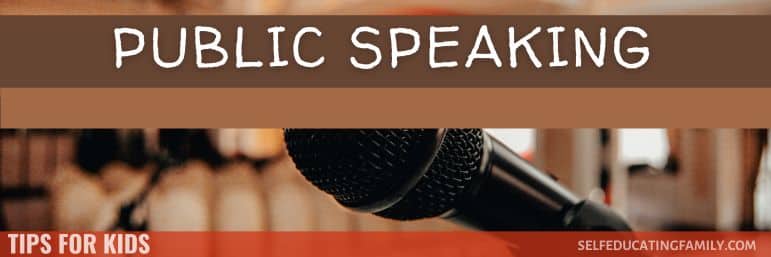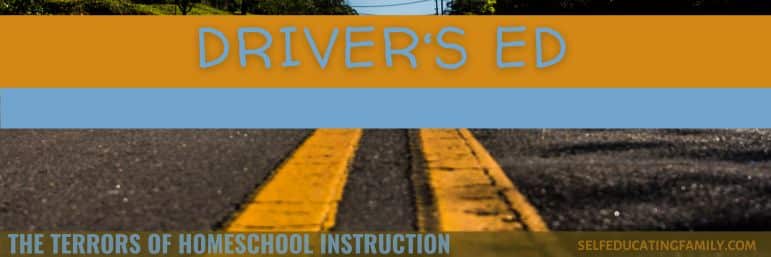What’s inside: Homeschooling High school may seem daunting, but with a little planning you can have less panic and more learning. Get tips and strategies for homeschooling through high school.
* This post may contain affiliate links. If you find my content valuable and make a purchase through one of my links, I will earn a commission at no cost to you, which helps me keep this blog going so I can help you even more! I recommend products I trust and/or use myself, and all opinions I express are my own. Read the full disclaimer here.
I recently had an urgent message from a friend who was considering homeschooling for high school. She was getting ready to switch back to homeschooling for the fall semester for her soon-to-be 9th grade son, who had attended a public charter middle school. She had homeschooled her kids through the younger grades, but hadn’t homeschooled any of her other children through high school and she was having that brief moment of panic when your brain starts screaming at you, “HOW DO I DO THIS?” or “WHAT IF I RUIN THEM?”
I overcome such moments by extensive research.
And so, I offered her my semi-random thoughts and experiences from homeschooling my twins through high school, some lessons learned, recordkeeping, selecting courses, testing and tailoring the experience for each kid. I am sharing with you today.
This is a weird place to start, but…
Record Keeping
Keep a Transcript
I have used a free excel sheet from Mary Ann at the Homeschool Mom for several years. It helps me keep track of everything. Her website also has a ton of resources for subscribers. Keep in mind, however, that her transcript is not a comprehensive solution, as she mentions. But it works great for keeping track of the homeschooling that your student completes starting around 8th grade and going through high school.
Believe that you will not remember what book you supplemented with for 9th grade history by the time 12th grade rolls around. You may never need it, but if you do, you’ll be glad you wrote it down. Trust me on this one.
Keep a Reading Log
And keep a reading log, especially if you use a living books or classical based curriculum. Your kid should do this—nothing fancy, just title & author will work. Here’s a free “Summer Book log” to give you an idea of what one looks like.
Professional Transcripts
By the time my two oldest sons got to the end of their junior year, they started to need an official “pretty” transcript. So for that, I also use a paid transcript service for the nice looking final version of the transcripts that are sent out with college and scholarship applications.
It’s called Transcript Maker and was designed by a former homeschooler — so he knows homeschooling. If your students are just starting the high school years, you don’t really need something that looks that good until places start to require them. Matt at Transcript Maker happened to be having a sale and always has a free 2-week trial. I tried it and really liked his advice and his software. One of the nice things about it is that I can use it this year for my seniors, then let my subscription run out until I need it again with my younger son, and your data will still be there.
I also recommend Lee Binz and HSLDA for advice on transcripts and homeschooling high school. Lee recommended that most helpful advice of taking detailed notes on what your student does in each class – be very specific on the curriculum, coursework, books used, outside teachers’ names, because you just won’t remember. Especially if you have more than one child!
Repeat: You Will Not Remember
Let me repeat. You WILL NOT remember what your kid did in 9th grade. So take good notes. Keep track of texts used and grading systems and outside work. Everything you think might be pertinent. You won’t use it all necessarily, but it will trigger your memory when it comes time to make an official transcript if you need one. It really only takes a few minutes if you do it at the start of each term.
Another pointer from Lee, is to use standard names for courses, “Biology” or “Algebra I”, on your transcript. So use homeschooling course names that align with what standard high school transcripts when possible. If you have to explain what the course is because your child took a year of “Indigenous Plants from Iceland in Literature,” you’d better take especially good notes AND keep a book list!
I could talk for a long time on this subject. When my guys started high school, I felt like they needed to have their academics verified, so our family choose to take CLEPs where available. My youngest son will be starting that next year. I may start him on APs also. Sometimes, it feels like the tests give outside proof that my kids learned the material and that it was rigorous. How can a college tell if your “A” is the same as the public school “A”? Many homeschoolers do teach until mastery is achieved (a.k.a. an “A”).
Tailor Homeschooling High School for your Kid
Tailor the experience specifically for your kid. Know his strengths and weaknesses. You want the student to still love learning by the end of high school.
Charlotte Mason
My underlying principles are based on Charlotte Mason’s ideas, so I try to incorporate that where I can, though I’m constantly trying to improve my methods, for instance in narration skills.
AmblesideOnline (AO) has a good totally free complete curriculum. I have been homeschooling with it since before high school – Charlotte Mason’s methods have been at the heart of what we do even if I’m using a different curriculum. We could only do one year of almost the full Ambleside Online curriculum. The full load is WAY too much. We had to learn to tailor our year from AO’s curriculum. AO has great lists of living books, very similar and with a lot of overlap to classical education curriculums. AO is reading intensive, so you’d have to keep up with the reading as much as possible.
Support groups are still important during this time, but it does change from when they were you (remember, this post is about high school choices; if you are considering homeschooling for younger ages, it’s a different ball game!)
Our experiences
For us, intensive reading worked at varying levels. One son is a voracious reader, one typical (which probably means he reads MUCH more than the average American!), and one just learned to read in 6th grade due to dyslexia. I wanted my non-reader to have to rich stories on “the booklist”, so he gets many more books on tape than Voracious reader, who really doesn’t get any except on long car rides. Independent reading is still required from all my kids, at least 1 book a term and at least 1 together with me (so I can make sure comprehension is going well) and he also always has a “spreeder” book going.
Spreeder is a speed reading program. It helps with eye tracking too and whole phrase reading (instead of individual words or letters). I choose a lower-level book for the Spreeder since that is working on fluency and you don’t want to get hung up on vocabulary. I also actually require Voracious and Typical Readers to practice speed reading – Voracious, as a refresher once a year, and Typical a bit more than that. Non-Reader is supposed to do 10-15 minutes a day. Sometimes, it’s hard to make sure he’s completing all his work, but that’s another story, isn’t it?
Have You Tried Online Courses?
* Disclosure: This post contains affiliate links, meaning that if you make a purchase after clicking through, SelfEducatingFamily will receive a small commission at no extra cost to you.
We started using video and online classes for homeschooling at the beginning of high school. For Junior year Physics, my sons are taking AP Physics 1 and 2 (because they haven’t taken calculus yet). They are using the DIVE program with the Saxon Book. Excellent combo. Again, I was so impressed with their program that we switched my youngest son over into the DIVE program too for science in 8th grade. Rigorous, thorough and interesting. He finished the integrated Chem & Physics and will be taking Biology with Lab in 9th grade.
The online version aids in accountability and in scheduling. My youngest son enjoys the systematic approach, and I like seeing where he is in the course. For Bio, I do own all the lab equipment still from when I ran a Biology Co-operative, and I’ll get him his own dissecting kit mailed to us.
My two older sons also took the Tom Woods Government class that’s available at RonPaul Curriculum (RPC) or if you become a Master Member at Liberty Classroom. (See our Resources page or a review of the Ron Paul Curriculum or our Liberty Classroom review). These are online, video-based curriculum programs so I think they are more well suited to high school students. We learned a lot of unexpected lessons, including writing a kindle book, on our journey to becoming self-learners, though I had to learn how to evaluate independent learners.
My math-loving son also took the AP Computer Science A class. He used a free course on Udemy by Moksh Jawa called Decoding AP Computer Science A, which must be effective since he got a 5 on the AP test.
CLEP Tests
I also integrated CLEP tests at the end of the courses they studied throughout high school when they were taking classes that had a college equivalency test. The DIVE science classes also sell some AP/CLEP prep courses.
We’ve even taken CLEPs for some classes that were just in their interest zone. For instance, one of my twins did a 3-week cram session and passed a Microeconomics CLEP using the REA guide for practice. He was semi-familiar with the content due to overlap from his business classes in the RPC. He’s planning on taking a few more.
With all of the college credits through the CLEP program, both my older sons will be finishing their Associates Degree concurrently with their high school graduation.
For my younger son, however, his high school plan looks different. Right now, our plan is to continue with DIVE science for Bio – not sure if he’ll take the CLEP, the AP or both! Math without Borders (I’m loving their Geometry this year – very hands-on). I’ll continue heavily supervising him in English but we’ll start ramping up the writing. I generally tailor his booklist toward whatever era of history we are studying, and we also use the Tom Woods history classes.
Remember, Keep Calm
Anyway, the big thing to keep in mind is to not panic. You can do this. Keep good notes on what you do.
What’s your biggest challenge in facing high school? Teaching Driver’s Ed?
You can do this!







